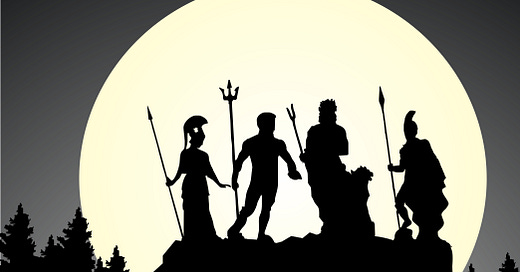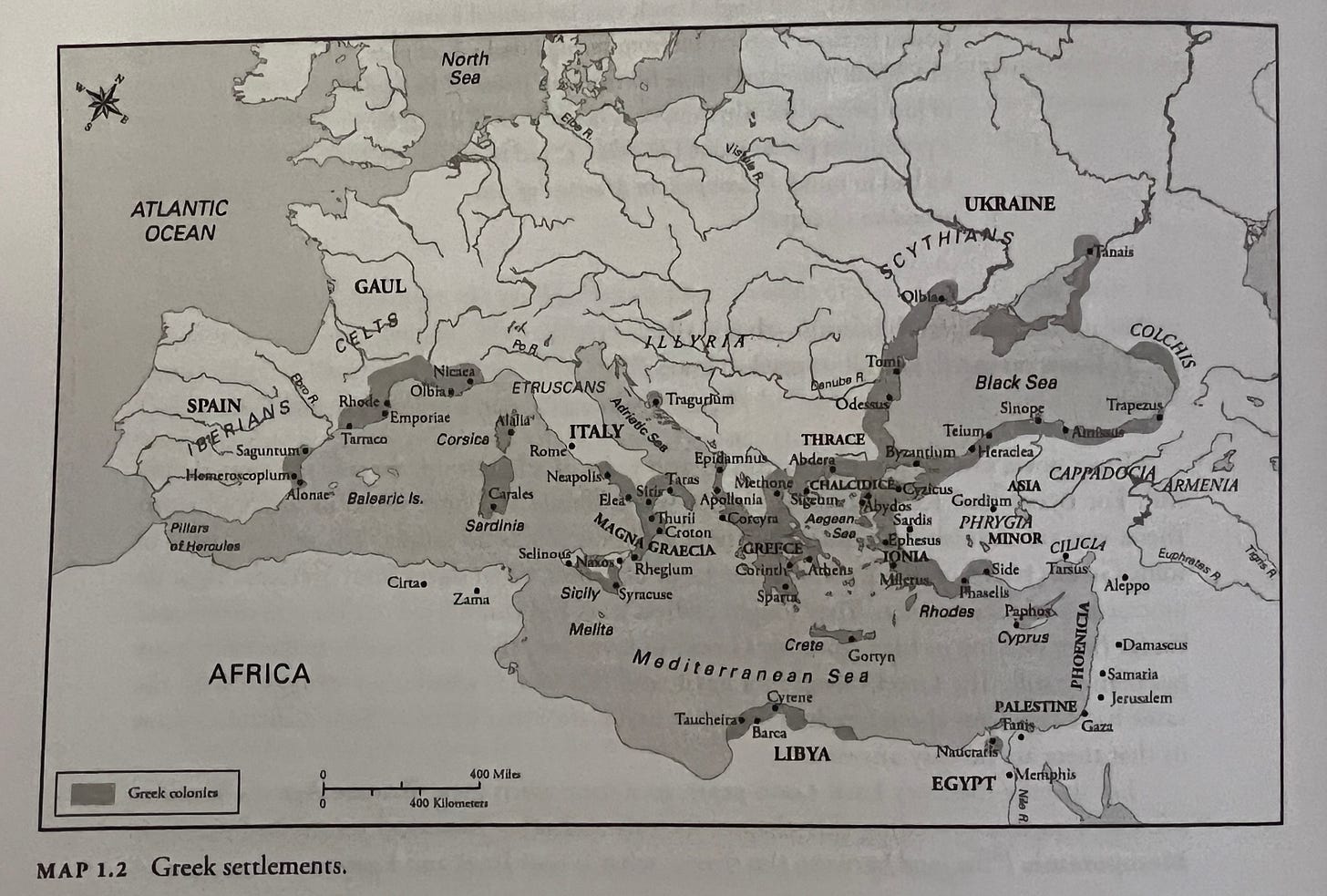Part 4 | Review of Modern Witchcraft with the Greek Gods | Chapter 2 - A Brief History of the Greek Gods
While I do not think the authors intend to promote white supremacy, western colonialism, and exceptionalism, I do believe they are completely blinded to how what they say stems from white supremacy.
Part four of my review of Modern Witchcraft with the Greek Gods by Astrea Taylor and Jason Mankey proceeds onward to chapter 2, A Brief History of the Greek Gods.
Mankey, on page 15, explains what the book is and who it is for.
This book is designed for Witches who want to know more about the deities of Olympus in both the Classical period and today. While it has a lot of history in it, it's not an academic work and does not claim to be the final word on the Greek gods. It's also not a book on Greek devotional polytheism or an attempt to recreate the religion of the Greeks from the year 400 BCE. This book is for people looking to connect with the deities we cherish in the here and now.
“While it has a lot of history, it’s not an academic work.” With this one sentence alone, I would advise people interested in reading this book just to read it for the witchcraft and ignore the “history.” This sentence roughly translates to, “I throw a lot of information in here; you will see citations, but I lack the critical skills of a historian to ask the proper questions of the materials I read and cite in this book, and I should not be held accountable for any errors I may make with the information I present or the story I attempt to tell with the sources I use.”
Mankey and Taylor, together, thus far in my reading, do much work trying to convince the reader that the Greek Gods, while Greek, aren’t just Greek or only for Greeks. But unfortunately, their way of explaining the universality of the Greek Gods is awkward. It shows a lack of understanding or the vocabulary needed to express what they want to say. Instead of an articulate explanation of the Gods’ universality, the reader receives a lot of mental gymnastics with history along with a theological framing. For example, Mankey writes on page 14:
Even in the ancient world the Greek gods were never confined to just Greece, and today their images adorn buildings on continents that their first worshippers didn't even know existed…. The Greek gods also adopted various guises as they traveled across the ancient world.
On page 15:
In recent years, some individuals have attempted to place the Greek gods in a gilded cage and restrict their worship on the basis of ethnicity. The Greek gods have never been limited in such a way. While we have respect for those trying to revive the religious traditions of classical Greece, the Greek gods have traveled far and wide over the last 3,500 years and have never been limited to just one geographic locale. In fact, some of the Greek gods have origins that lie far from the Greek mainland.
There are some problematic things with what is being said here. First, because the book is written by practitioners of a religion (Witchcraft), the narrative about the Gods is fully theological rather than historical or anthropological. When Mankey writes, “The Greek gods…traveled across the ancient world” and “Greek gods have traveled far and wide over the last 3,500 years,” – this is a theological statement. A historian or anthropologist would never say the Gods themselves travel to explain how the Greek Gods appear in all the geographical places they appear in because it is people that bring Gods with them as they travel. Mankey has erased the only explanation for why Herakles can be found in the Roman baths in England that he saw and told the reader in the opening pages of this chapter.
Further, when Mankey writes, “their images adorn buildings on continents that their first worshippers didn't even know existed,” he assumes what exactly? That this happened because the Gods did it themselves? The reason why the Gods appear on buildings on those continents is that people put them there. The reasons why they were put up on those buildings, as some would argue, is tied up with White Supremacy. This brings me to the observation that the authors completely side-step addressing topics such as imperialism and colonialism, white supremacism, and western exceptionalism when talking about the Gods being on those “buildings on continents their first worshippers didn't even know existed.”
I recall that in the introduction, Taylor wrote, “Most historians agree that ancient Greece shaped the world that followed, and some of the best parts of our society may have come from the Greeks. It’s our opinion that the Greek gods were behind these improvements, and they continued to evolve alongside humanity into the modern area.” (Page 4). This framing made by the authors reminds me of an article I read, The Whitening Thief: Latent White Supremacy in Percy Jackson.
The gods move with the heart of the West. …What you call ‘Western civilization’… is a living force. A collective consciousness that has burned bright for thousands of years. The gods are part of it. You might even say they are the source of it, or at least, they are tied so tightly to it that it that they couldn’t possibly fade, not unless all of Western civilization were obliterated. The fire started in Greece. Then, as you well know, the heart of the fire moved to Rome, and so did the gods. … [They] moved to Germany, to France, to Spain, for a while. Wherever the flame was brightest, the gods were there. They spent several centuries in England. …And yes, Percy, of course they are now in your United States. … America is now the heart of the flame. It is the great power of the West. And so Olympus is here.
So much of what Taylor and Mankey write resembles so much of these attitudes listed here. Read the article, please. While I do not think the authors intend to promote white supremacy, western colonialism, and exceptionalism, I do believe they are completely blinded to how what they say stems from white supremacy and western colonialism. I have to wonder how much self-reflection they have done to evaluate their thoughts and arguments to determine if what they write is white supremacist in nature.
It is clear that their goal is to argue for the Gods’ universality but use arguments that come from white supremacy unknowingly or unconsciously. White supremacy concerning the Greek Gods is a hot-button issue. White supremacy can lead to the erasure of Greeks as not really being Greek. A white supremacist pagan blogger called us, in a nutshell, hairy-knuckled Balkan bastards. Thus, making the Greek Gods the property of anyone since there are no real Greeks anymore. You can read more about this by looking into Jakob Fallmerayer’s racial claims about the Greeks.
I have to ask, did Mankey have white supremacy in mind when he wrote on page 15, “[i]n recent years, some individuals have attempted to place the Greek gods in a gilded cage and restrict their worship on the basis of ethnicity. The Greek gods have never been limited in such a way.” When I see the word ethnicity, I would assume he is referring to Greek people because Greek is an ethnicity. What other ethnic group would make sense in this context? If Mankey is making this claim in a passive-aggressive way, it is a lie because no prominent Greek group that I can recall ever made such claims which would warrant such a comment by Mankey.
Is he talking about white people? I must remind myself that for Americans, ethnicity is also used interchangeably with race; if Mankey has race on his mind when writing this statement, then yes, there are white supremacists, usually from a northern European background, who will argue that the various European Gods are only for white Europeans. If this is what Mankey is referring to, I find it disappointing that he didn’t take the opportunity to call out white supremacy. With all this taken together, I see strong elements of white supremacy present in this book, and it makes me deeply uncomfortable.
Instead of justifying the universality of the Greek Gods by erasing people, making a theological claim, and flirting with white supremacist-rooted thinking, it is much simpler to say that Gods themselves are universal and can be worshipped by anyone because history shows that the Greeks didn’t think the Greek Gods were exclusive to only Greeks. Traditions, however, are another story, which is why throughout this series of reviews, I have made clear that whatever Witches do in Witchcraft isn’t of any concern to a Greek like myself. Witchcraft is its own tradition and has its own standards and rules.
It is evident that Mankey needs to gain familiarity with some basic things about Greek history. When he writes, “[i]n fact, some of the Greek gods have origins that lie far from the Greek mainland,” I have to ask, does he think ancient Greece roughly correspond to the Greek country today? Greece (Hellas) in the ancient world comprised everywhere the Greeks built cities. Greece in the ancient world included everything shaded in the map below.
So, with this in mind, which Gods does Mankey claim have “origins that lie far from the Greek mainland” but would turn out to still be in or near Hellas?
Because this is a Witchcraft book and not an academic one, I cannot simply read what Mankey is writing as his attempt to explain some historical information. He likely has an agenda, like many Pagans and Witches do when it comes to Gods from cultures they do not come from and have unresolved guilt. Somehow, I assume, arguing that some Greek Gods originate “far from the Greek mainland” aims to make those Gods less Greek and more ambiguous, which allows the reader to justify working with Aphrodite, for example. Here is how the usual Pagan/Witch argument occurs, which uses the framing Mankey has supplied.
Aphrodite originates in Cyprus, “far from the Greek mainland,” and she is actually Ishtar by another name, so….”
Lots of jumping through hoops to soothe what I see to be anxiety over interacting with Gods from a culture not your own. This kind of white awkwardness is very annoying, to be honest. It is really unneeded.
If you are looking for a good book on the Greek Gods across the ancient world, I recommend Greek Gods Abroad: Names, Natures, and Transformations by Robert Parker. In it, you will learn, among other things, about Interpretatio, how Gods are interpreted across different cultural groups, something which would have been very helpful and relevant in Mankey’s chapter but never makes reference to the term or scholarship that deals with the matter of the Interpretatio of the Gods. Maybe I will encounter Interpretatio in the rest of the chapter, but for now, this is the end of part 4 of my review.






I've been reading all of these (though I had no plans to read this book to begin with) but I want to express my appreciation for the further reading suggested in this part, much of which I wasn't previously familiar with. I've been working my way through some problems with how I received Greek mythology as an American (which I know you've already discussed at length so I won't belabor that) and I suspect those books will be very helpful.